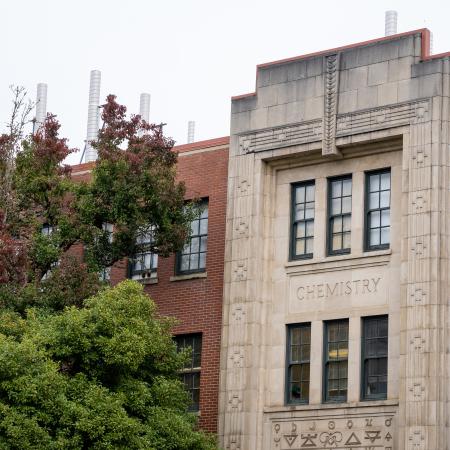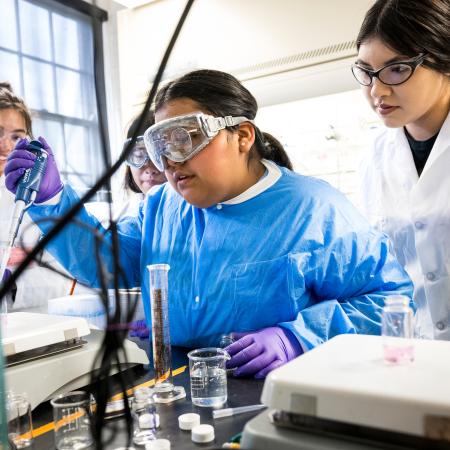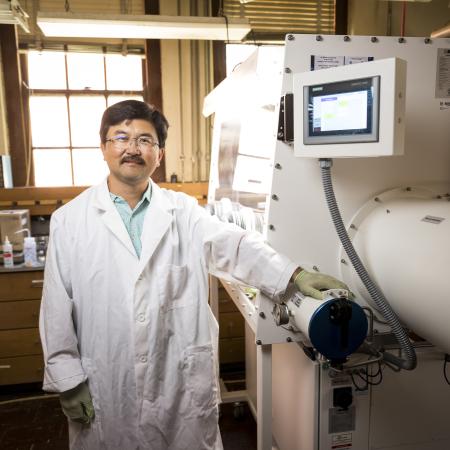In addition to providing important foundational courses for numerous majors throughout campus, our lower-division courses educate the “next generation” of doctors, lawyers, business professionals, politicians, etc. about the importance and broad-reaching impact of chemistry. Additionally, these students learn important problem solving and critical thinking skills. The Department maintains a University-recognized level of high-quality instruction in these courses. Our instructional faculty and programs receive College and University level awards for innovation and addressing student success. We promote student engagement in our classrooms which is an important contributor to student success. We have worked to develop processes to identify early and work with at-risk students in foundational courses. We support the University’s First-Year Experience program to implement a number of early-intervention activities with the intent of improving student success. Additionally, the Department is a national leader in online instruction.
The Chemistry Department maintains a strong majors program supported through numerous options and our pioneering upper-division integrated laboratories. We use modern pedagogies such as inquiry-based laboratories, and virtual laboratories, to engage our students. Many of our students engage in high-impact experiential learning (such as undergraduate research, internships and externships, and Research Experience for Undergraduates (REU) activities). We offer ten major options, about 40% of our majors select one of the two options that lead to an ACS-certified Chemistry degree. OSU’s Strategic Plan 4.0 focuses on providing distinctive curricula and supporting innovative pedagogy to advance our mission and vision. We share this vision in the goals indicated below.
Develop more uniform graduate program requirements
including coursework, seminars, cumulative exams, independent research proposals, and graduate fellowship applications. Increase use of modern course delivery via Ecampus or micro-learning environments. Course planning will aim a curriculum comprising a core (3 courses) with fundamental and broadly useful topics such as structure determination, chemical separations, quantum mechanics and thermodynamics, discipline-specific courses, courses offered by other departments such as Biochemistry/Biophysics, Pharmacy, Engineering, Physics,etc., and professional development courses (for example on proposal preparation, innovation, instructional mentoring, science communication, or professional success through diversity and inclusion).
Metrics
By the second year, we will evaluate our graduate program graduation rates, with a target to be above the national average. We aim for 100% of graduate employment. We will target a 25% increase in out-of-department enrollments in our courses.
Ensure that all Chemistry majors have access to mid-level experimental chemistry courses in their sophomore year
Experimental and classroom instructions should be complementary to student learning outcomes. This symbiotic relation should help with student retention and graduation rate.
Metrics
Confirm that all sophomore Chemistry majors with the necessary pre-requisites can enroll in mid-level experimental classes; see if changes correlate with improved retention and graduation rates.
Increase participation of undergraduate chemistry majors in research
We will encourage students to begin early - in their freshman or sophomore year. Our students will benefit in several ways: from the introduction to emerging ideas and problems in chemical research, the opportunity to work as part of a team to solve complex problems, by developing their professional and social network, and by getting more impactful recommendation letters. Fundraising should provide scholarships to help offset some of the associated research expenses.
Metrics
The Department will survey majors to determine if participation in research is increasing, and to determine the duration, depth, and quality of this lab experience. Evidence of increased research contributions will be tracked by the number of student acknowledgment or co-authorships in publications and meeting presentations.
Incorporate innovation into undergraduate and graduate curriculum
Foundational efforts already exist through new course offerings in translating research to market, and innovation elements in our major’s orientation program. Expanding innovation training within the Chemistry curriculum will provide differentiating skills for our graduates.
Metrics
In the first year, we will establish an innovation curriculum task force charged with developing a comprehensive strategy for curricular changes. By year 3, we should (a) create an innovation option for our undergraduate and graduate Chemistry programs; (b) create a new course(s) and/or partner with existing resources to support these new options. An example would be a new upper-division undergraduate Ecampus course such as “Addressing Societal Needs through Chemical Innovation” that satisfies the “Science, technology and society” bac core classification and incorporates some of our Lens of Market modules with an added chemistry focus.
Establish and support on-campus and online instructional innovations
(e.g., use of technology, guided inquiry, collaborative/group learning, and hybrid courses). This requires associated professional development opportunities, such as attending regional and national conferences, some of which exist on campus.
Metrics
In the first year, we will assess the number and type of course offerings with respect to innovative course pedagogies, technology, etc. to reveal targets. For example, we may aim to increase the number of hybrid course offerings by one additional course per year for the coming three years.
Maintain a Departmental ECampus Coordinator
This might be a shared position if there is a match with other departments in the College.
Metrics
A 10% growth in chemistry Ecampus enrollment per year for the first three years would strongly justify this position.
Improve our understanding of issues that impact student retention
We will work with the College to survey students that transfer out of the Chemistry major to understand the causes. The Department will also survey Chemistry majors annually to evaluate how well they are being served by our curriculum and program. These surveys should be tailored to the students’ year in program.
Metrics
By the second year, we will aim for survey participation rates of more than half of our majors. A survey data report and proposed actions will be considered annually at each faculty retreat.
Focus on improving student success rather than on lowering DFW rates
Our faculty consensus is that over-emphasis on a DFW target can be too simplistic and does not advance our mission properly.
Metrics
In the first year, we will establish success metrics, such as percentage of students receiving an A-C grade in the next course in sequence, and begin to collect these data. In the third year, we use success data to evaluate student progress and guide any changes in our methods and curriculum.
Administer the ACS general chemistry exam annually
Metrics
By the second or third year, we will establish a baseline and consider how our curriculum serves students with respect to the national standards and curricular expectations.



